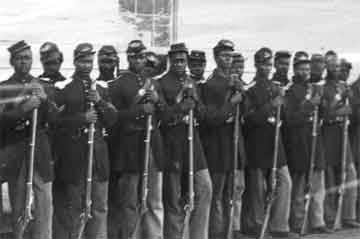African American Enlist in Union Army

On July 17, 1862, Congress authorized the acceptance of black soldiers in the Union army. 186,000 Black served in the Union army. 38,000 lost lives. Like most of the casualties in the war, the majority of deaths did not take place in the battlefield, but were caused by disease.
One of the earliest instances of African Americans serving in a military capacity during the Civil War was the formation of the 1st South Carolina Volunteers, later renamed the 33rd United States Colored Infantry Regiment. This regiment was formed from escaped slaves and was authorized by Union General David Hunter in May 1862, although this decision was initially not sanctioned by the federal government. The regiment had to be disbanded but was later officially reformed in August 1862.
Another significant event occurred in Kansas, where Senator James H. Lane authorized the formation of a regiment that would later be recognized as the 1st Kansas Colored Volunteers. They saw action as early as October 1862.
After the Emancipation Proclamation, recruitment of African American troops became more formalized, and they began to serve in the United States Colored Troops (USCT), a branch of the federal armed forces. The 54th Massachusetts Volunteer Infantry became one of the most famous African American units. Led by Colonel Robert Gould Shaw, the regiment gained fame for their brave assault on Fort Wagner in South Carolina, an event later depicted in the 1989 film "Glory."
One of the early concerms was the threat by the Confederates to execute any African American who were captured. That threat was amerliorated when the Union threated to execute Confederate prisoners if the Confederates executed Black prisoners.
The contributions of these early African American soldiers were manifold. They provided much-needed manpower to the Union Army, but their service also struck a symbolic blow against the institution of slavery and for the cause of civil rights. Their courage in battle helped to counter prevailing racist attitudes of the time, eventually leading to greater roles for African Americans in the military and contributing to the broader struggle for civil rights. By the end of the war, approximately 180,000 African Americans had served in the Union Army, and about 30,000 served in the Navy.
A number also received the medal of honor:
They included
- Sergeant William H. Carney
- Sergeant Major Christian Fleetwood
- Private James Daniel Gardner
- Private James H. Harris
- Sergeant Thomas R. Hawkins
- Alexander Kelly
- First Sergeant Robert A. Pinn
- Alfred B. Hilton
- Cpl Charles Veal
- 1st Sgt James Bronson
- 1st Sgt Powhatan Beatty
- Sgy Alexander Kelley
- Cpl Miles James
- 1st Sgt. Edward Ratcliff
- Sgt James Harrison
- Pvt William H Barnes
- Sgt Decatur Dorsey
 >
>